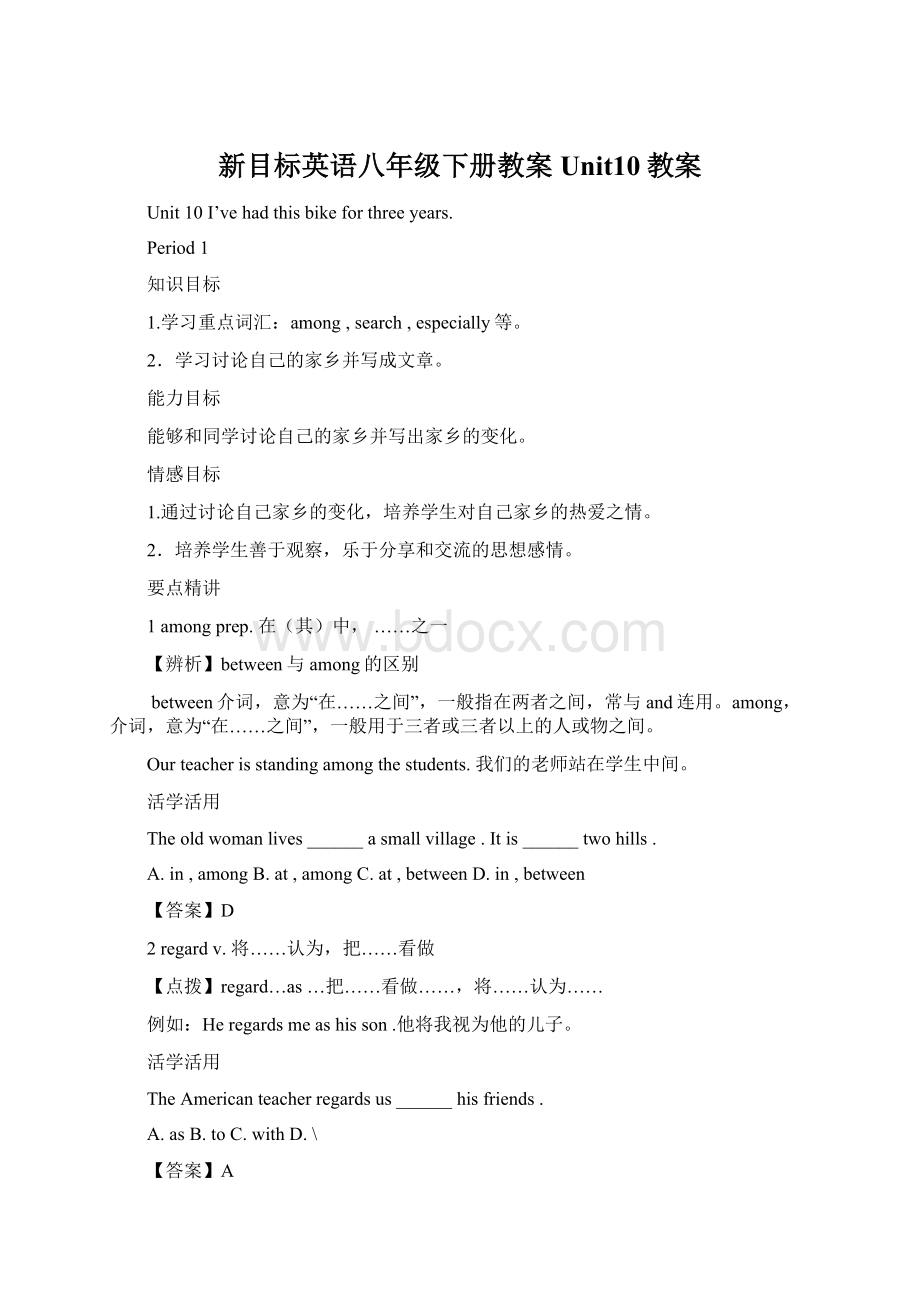新目标英语八年级下册教案Unit10教案.docx
《新目标英语八年级下册教案Unit10教案.docx》由会员分享,可在线阅读,更多相关《新目标英语八年级下册教案Unit10教案.docx(18页珍藏版)》请在冰豆网上搜索。

新目标英语八年级下册教案Unit10教案
Unit10I’vehadthisbikeforthreeyears.
Period1
知识目标
1.学习重点词汇:
among,search,especially等。
2.学习讨论自己的家乡并写成文章。
能力目标
能够和同学讨论自己的家乡并写出家乡的变化。
情感目标
1.通过讨论自己家乡的变化,培养学生对自己家乡的热爱之情。
2.培养学生善于观察,乐于分享和交流的思想感情。
要点精讲
1amongprep.在(其)中,……之一
【辨析】between与among的区别
between介词,意为“在……之间”,一般指在两者之间,常与and连用。
among,介词,意为“在……之间”,一般用于三者或三者以上的人或物之间。
Ourteacherisstandingamongthestudents.我们的老师站在学生中间。
活学活用
Theoldwomanlives______asmallvillage.Itis______twohills.
A.in,amongB.at,amongC.at,betweenD.in,between
【答案】D
2regardv.将……认为,把……看做
【点拨】regard…as…把……看做……,将……认为……
例如:
Heregardsmeashisson.他将我视为他的儿子。
活学活用
TheAmericanteacherregardsus______hisfriends.
A.asB.toC.withD.\
【答案】A
3considerv.注视,仔细考虑
【点拨】considerdoingsth仔细考虑做某事=thinkaboutdoingsth;consider…as…把……视为……=regard…as…
例如:
Pleaseconsidercomingandjoiningus.请考虑来加入我们。
Iconsiderreadingbooksasarelaxingactivity.我将看书视为一项休闲活动。
活学活用
1.Nowadays,thestudyofEnglishisconsideredasaveryimportantindustryinChinaaswellasintherestoftheworld.
A.isregardedasB.islookedasC.takesasD.treatsas
【答案】A
2.let’sconsider______,shallwe?
A.goswimmingB.togoswimmingC.goingswimming
【答案】C
4Ourhometownhasleftmanysoftandsweetmemoriesinourhearts.我们的家乡在我们的心里留下了柔软甜美的记忆。
【点拨】leave…+介词短语把……留在\落在……
例如:
Ihurriedtoschoolthismorning,soI______mybagathome.
A.forgotB.leftC.lostD.put
【答案】B
活学活用
—Showmeyourhomework,Dave?
—Sorry,Mrs.Brown.I'veitathome.
A.missedB.forgottenC.lostD.left
【答案】D
课时训练
Ⅰ.用所给词的适当形式填空________
1.Therewereat________(little)1,000peopleattheconcertlastnight.
2.Itisn'teasy_________(be)afamousperson.
3.Everyone_________(have)a__________(wonder)timeonthesquaredancingexcitedly.
4.MillionsofChineseleavethecountryside________forworkinthecities.(search)
5.Iusedto________homeatleastonceayear.(return)
6.Iconsider__________(watch)three�Dmoviesathomewearingthespecialglasses.
7.Iwasreallyhappy_________(meet)youhere.
8.That’s________ofmyhometown.(truth)
9.Weallthinksuch________aregood.(develop)
10.Hebroughtalotofsweet________tous.(memory)
Ⅱ.用适当的介词填空
1.Wehadawonderfultime________ Sundaymorning.
2________myopinions,heshouldgetupearlyandtakeexercise.
3.Mymotheroftenhelpsme________ myEnglish.
4.Ihavewaited________him________awhile.
5.Heissearching________agoodjob.
III.根据句意及汉语提示完成句子
1.Ihavestudiedinthatschool________________________________.(自从20世纪中叶)
2.It’sthe_______________________________..(我们城市的标志)
3.Mostofthechildren_______________________.likedtoplaytogether.(在我的时代)
4.Theylikemanykindsofsports,_______swimming.(尤其是)
5.Heisthebestteacher_______________________..(在我们心里)
6.Ithinkspeakingimpolitelytoparentsis_______________..(可耻的事情)
7.Ittookhim2daysto_______________________________..(返回他的故乡)
8._______________Tom,somethingswillneverchange.(根据)
IV..用方框中所给单词的适当形式填空,使对话通顺、正确。
每词仅用一次
freedommeetcoolencouragewrong
Tom;Hi,Dad,doyouhavetimeforachat?
Ihave66someproblems.
Dad:
Oh,Tom,what’s67?
Tom;Dad,youandmumarealwaysaroundme.Idon’thavemyowntimeand68
Dad:
Arewe?
Tom:
Yes.Ialwayshavetoobeyyou,butI’mabletodecidemyownbusinessnow.
Dad:
Oh,Ididn’trealizethatwehardly69youtomakeyourowndecisioninthepast.
Tom:
Dad,Ihavegrownup.Pleasedon’ttreatmelikeachild.
Dad:
I’msorry.Welltrytochangeourselves.
Tom:
That’s70.
Dad:
Son,remember,wearealwaysopenforachat.
V..单项填空
( )1.Thematchwasreallyfantastic,______whenSmithscoredinthelastminute.
A.probablyB.exactlyC.especiallyD.mostly
( )2.[2012·重庆]Ididn'tbelievehecoulddrive________hetoldme.
A.once B.while C.since D.until
( )3.—Howlonghastheforeigner______here?
–Hehas______hereforseveralhours.
A.arrived,comeB.come,gotC.stayed,beenD.left,beenaway
( )4.Wearegoingto________withsomefriendsforapicnicthisweekend.Wouldyouliketocome?
A.getonB.getawayC.getalongD.gettogether
( )5.Itisdifficult________anewstudentinanewschool.
A.beingB.isC.beD.tohave
( )6.Shemaybeslowbut________she'sreliable(可靠的).
A.atmostB.atleastC.stillD.however
( )7.Mygrandma______alotofchangesinChangchunsinceshecamehere.
A.seesB.canseeC.willseeD.hasseen
( )8.I______myhometownforalongtime.Ireallymissit!
A.leftB.wentawayfromC.haveleftD.havebeenawayfrom
( )9.Ioftenhelpmyaunt________hercarandsheoftenhelpsme________myEnglish.
A.wash;learningB.towash;for
C.wash;toD.wash;with
( )10.Thebook______prettypopularsincetheywerepublished.
A.becomesB.willbecomeC.hasbecomeD.isbecoming
( )11.YaoMingis______asoneofthemostpopularbasketballplayersintheworld.
A.regardedB.madeC.keptD.watched
( )12.--Canyouanswerthetelephone?
I’mbusy______theInternet.
--OK,I’llgetit.
A.searchB.tosearchC.searchingD.searched
( )13.【2013安徽】IwillmeetJaneatthestation,Please____________whattimeshewill
arrive.
A.countB.chooseC.checkD.catch
( )14.It’sdifficulttoliveinaforeigncountry,______ifyoudon’tspeakthelanguage.
A.exactlyB.naturallyC.usuallyD.especially
( )15.—Ithinkitwillbesunnytomorrow.
—Ihope________.Iwanttogohiking.
A.notB.realC.reallyD.so
VI.阅读理解
JoeReadstudiedinthisschoolforfourteenyears.Whenhefinishedschool,hewasalreadyeighteenyearsold.Andthenhisfathersaidtohim,“Youfinishedschool,andyouareagoodstudent.Nowyoumaygototownandgetagoodjob.Theyneedsomecleverpeopletoworkintheoffice.Thepeopletherecangetalotofmoneynow.Ifyoustayathome,youcan'tgetmoneyfromourfamily.”Afewweekslater,Joewenttotheofficeandaskedforajobthere.Amantookhimintoasmallroomandgavehimsomequestionsonapieceofpaper.Joeansweredthequestionsquickly,andhegavethepapertotheman.Themanlookedatthepaperforafewminutesandthenasked,“YouwerebornonSept.23.Butwhichyearwereyoubornin?
”Joeanswered,“Oh,everyyear.”
( )1.HowoldwasJoewhenhewenttoschool?
A.8. B.18. C.4. D.14.
( )2.Whatplacedidhisfatherwanthimtoworkin?
A.Aschool.B.Anoffice.
C.Ahouse.D.Ashop.
( )3.WhatdidhisfatherthinkofJoe?
A.Hewasagoodstudent.
B.Hewasn'tagoodstudent.
C.Hewasn'tclever.
D.Hecouldgetmoneyfromhisfamily.
( )4.WhydidthemangiveJoeapieceofpaper?
A.BecausehewantedtogiveJoeajob.
B.BecausehewantedJoetoanswersomequestions.
C.BecausehewantedtoknowifJoewasclever.
D.BecausehewantedtoknowhowoldJoewas.
( )5.FromJoe'sanswer,“Oh,everyyear.”,wecaninfer(推测)that________.
A.hedidn'twanttoworkintheoffice
B.hewashardworkingbutdishonest
C.hewasoutgoingandclever
D.infact,hedidn'treallyanswertheman'squestions
参考答案
Ⅰ.用所给词的适当形式填空
1. least 2._being__3._had__(have)a__wonderful__4.tosearch5.return
6.__watching__
7.__to_meet_8.true9.developments10.memories
Ⅱ.用适当的介词填空
1. on 2.In3.with4for;for
5.for
III.根据句意及汉语提示完成句子
1.lsincethemid-20thcentury2.symbolofourcity
3nmytime4.especiallys
5.inourhearts.
6.ashame
7.returntohishometown
8.Accordingto
IV.1.met2.wrong3.freedom4encouraged5.Cool
V..单项填空
1.C
2.D
3.C
4.D geton意为“上车”;getaway意为“离开”;getalong意为“相处,进展”;gettogether意为“聚在一起”。
根据句意可知选D。
5.A
6.B
7.D
8.D
9.D help一般用于helpsb(to)dosth“帮助某人做某事”和helpsbwithsth“在某方面帮助某人”结构中。
10.C
11.A
12.C
13.A
14.D
15.D
VI.1—5CBABD
Period2
现在完成时
一、意义与构成
1.意义:
表示过去
1)发生或已经完成的动作对现在造成影响或后果
2)某一时间开始并一直持续到现在的动作或状态
2.基本构成:
have/has+done(过去分词)
3.句型
基本结构:
主语+have/has+done(过去分词)
a.肯定句:
主语+have/has+done(过去分词)
b.否定句:
主语+have/has+not+done(过去分词)
c.一般疑问句:
Have/Has+主语+done(过去分词)
d.特殊疑问句:
特殊疑问词+have/has+主语+done过去分词
二、过去分词
与动词的过去式一样,动词的过去分词有规则动词过去分词和不规则动词过去分词两种。
1.规则动词:
规则动词的过去分词的构成规则与规则动词的过去式的构成规则相同
1)一般动词,在词尾直接加“ed”
如:
work—worked—worked;play—played—played;enjoy—enjoyed—enjoyed.
2)以“e”结尾的动词,只在词尾加“d”
如:
dance—danced—danced;live—lived—lived;place—placed—placed.
3)以“辅音字母+y”结尾的动词,将“y”变为“i”,再加“ed”
注意:
元音字母+y结尾的动词的过去分词的变法参见一般动词。
如:
carry—carried—carried;hurry—hurried—hurried;cry—cried—cried
4)重读闭音节结尾,末尾只有一个辅音字母,先双写这个辅音字母,再加“ed”
如:
plan—planned—planned;stop—stopped—stopped;drop—dropped—dropped
2.不规则动词
不规则动词的过去分词有5种形式:
A-A-A如:
cost—cost—cost;cut—cut—cut;hit—hit—hit
A-B-B如:
bring—brought—brought;build—built—built;catch—caught—caught;
keep—kept—kept;sell—sold—sold;smell—smelt—smelt;
learn—learnt—learnt;say—said—said;meet—met—met;
make—made—made;leave—left—left
此类变化涉及到的动词较多,需要同学们认真记忆。
A-B-C如:
begin—began—begun;blow—blew—blown;drive—drove—drive;
break—broke—broken;forget—forgot—forgotten;eat—ate—eaten;
take—took—taken;do—did—done
此类变化涉及到的动词较多,需要同学们认真记忆。
A-A-B如:
beat—beat—beaten
A-B-A如:
come—came—come
不规则动词的过去分词变化规则多,但是还是有一定的规律所循,希望同学们多花心思,细心记下,这是使用完成时态的基础。
三、用法
1.现在完成时用来表示过去已发生过或完成的动作或状态,但其结果却和现在有联系,也就是说,动
作或状态发生在过去但它的影响现在还存在。
Ihavespentallofmymoney.我花光了身上所有的钱。
(含义是:
Idon’thaveanymoneynow.)
Janehaslaidthetable.Jane已经把桌子摆好了。
(含义是:
Wecansitandhavedinner.)
Michaelhasbeenill.Michael病了。
(含义是:
Hecan’tcometoschool.)
Hehasreturnedfromabro